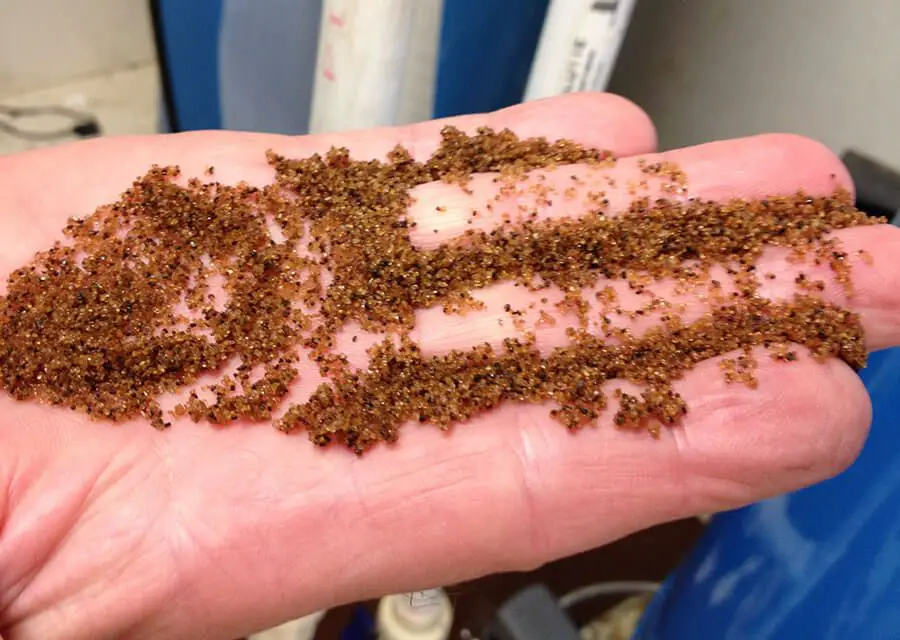Maintaining a clean water softener is important for ensuring your household water runs smoothly through pipes and appliances. Over time, hard water minerals like calcium and magnesium can build up in a water softener’s resin beads, reducing their effectiveness. Thankfully, there are several easy methods homeowners can use to clean their water softener resin and restore optimal function.
Page Contents
Why Clean the Resin?
Water softener resin beads work by attracting and latching onto the hard mineral ions in water as it passes through the softener. This process trades the hard ions like calcium and magnesium for softer sodium ions. Over time, the resin beads become coated with scale and sediment. If allowed to build up, this coating can cause a variety of problems:
- Reduced softening capacity – Hardness minerals will stay in the water
- Lower flow rates – Water pressure through the softener drops
- Shorter resin lifespan – The beads wear out faster
- Salt bridge buildup – Salt crystals accumulate and block brine from regenerating resin
- Bad tastes and odors – Hard or contaminated water enters your home’s supply
To keep your water softener working at optimal efficiency, it’s important to periodically clean away any built-up minerals coating the resin and salt tank. Most experts recommend deep cleaning your softener’s resin at least once per year.
How to Clean Water Softener Resin
You have three main options for cleaning the resin in your water softener tank:
1. Use a Resin Cleaner
Specialized resin cleaners offer an easy and effective method to break down mineral deposits, oils, and bacteria from resin beads. Look for a cleaner that is compatible with your type of resin material. Popular options include:
- Citric acid – Dissolves mineral deposits; follow manufacturer instructions for amount
- Sodium bisulfate – Removes iron; use 1 lb per cubic foot of resin
- Sodium hydrosulfite – Deodorizes and sanitizes; 2 lbs per 100 gallons
- Specialized resin cleaners – Formulated blends from reputable brands; follow label directions
To use a resin cleaner, simply pour the appropriate amount into the brine well of your brine tank based on resin volume. Then, manually start a regeneration cycle. The resin beads will be flushed with the cleaning solution instead of brine, scrubbing away built-up gunk.
2. Regenerate with Hot Water
Running a hot water flush is an easy, natural way to clean resin and break up sediment. To do this:
- Set water heater temperature to 140°F-150°F
- Manually start a regeneration cycle
- Hot water will flow through the resin tank instead of brine, helping clean resin beads
Flushing with hot water can help dissolve and rinse away calcium, magnesium, and other water-borne contaminants. Make sure to return your water heater to regular temperature settings afterward.
3. Disinfect with Household Bleach
Standard household bleach makes an effective resin disinfectant to kill bacteria or other microorganisms. To sanitize resin:
- Use 1 cup bleach per 3 lbs of resin beads
- Pour bleach into the brine well
- Manually start a regeneration cycle
- Bleach solution will flow through and sanitize the resin
This bleach disinfection procedure also helps deodorize resin beads. Make sure to use plain, unscented bleach.
Tips for Resin Cleaning
Follow these tips for safely and effectively cleaning your water softener resin:
- Wear gloves and eye protection when handling cleaners
- Refer to resin cleaner instructions for amount to use
- Clean resin at least once yearly for optimal performance
- Run a rinse cycle afterward to flush any residue
- Clean and sanitize brine tank and salt bridge, too
- Replace resin cleaners if they have expired
- Consider replacing resin beads every 8-10 years
Resin Cleaning Safety Tips
Exercise caution when cleaning water softener resin to avoid accidents or injury:
- Read cleaner product labels thoroughly and follow directions
- Never mix cleaners or bleach together – toxic fumes can result
- Wear gloves and eye protection when handling cleaners
- Work in a well-ventilated area
- Keep cleaners sealed and away from children/pets
- Avoid contact between skin/eyes and cleaners
- Never drink or ingest resin cleaners
When to Call a Professional
In some cases, it’s best to have a professional handle water softener resin cleaning:
- If resin is badly fouled and efforts to clean at home fail
- When diagnosing any decrease in softener performance
- If the softener requires major repairs
- To check if resin beads need replacing
- For annually scheduled maintenance and servicing
A local water treatment professional can use specialty tools and heavy-duty cleaners to rejuvenate badly contaminated resin. They can also inspect your entire system and make any needed fixes or part replacements.
Conclusion
Cleaning water softener resin beads is essential maintenance that is quick and easy to perform at home. Simple methods like flushing with hot water, using citric acid cleaners, or disinfecting with household bleach can remove harmful scale buildup and restore your softener’s full capabilities. Performing an annual deep clean keeps the resin working properly for the smoothest, mineral-free water. With some simple protective gear and supplies, you can keep those resin beads clean, healthy, and running at peak efficiency.
